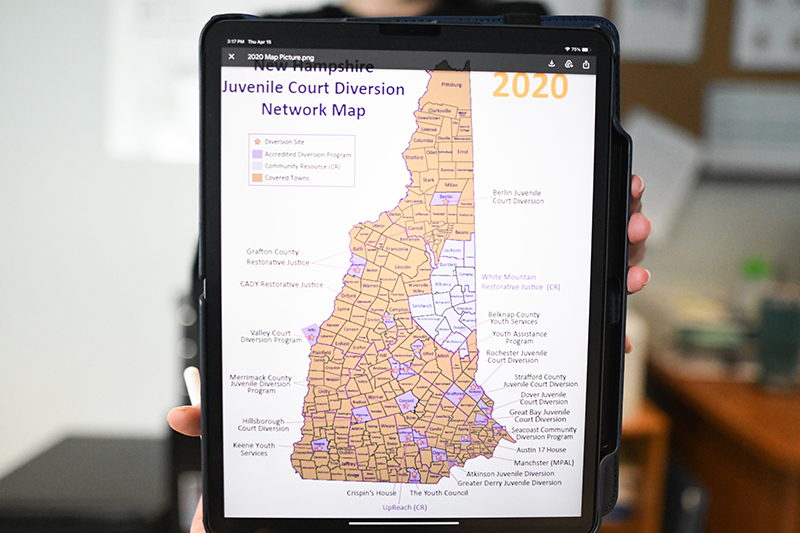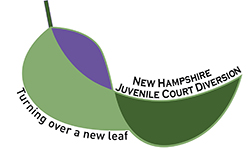Accreditation

Accreditation Information
In 2011, HB1686 introduced changes in the law to bring accountability and standards to programs that provide juvenile diversion services while ensuring they remain flexible enough to meet local needs. Programs that are accredited by the Administrative Judge of the Judicial Branch Family Division have met rigorous and demonstrated a high level of proficiency within their programs.
The New Hampshire Juvenile Court Diversion Network has an active Accreditation Committee that meets regularly to review and update standards, and programs are typically accredited for a 2-year period.
ACCREDITATION QUESTIONNAIRE
- Programs that are interested in becoming accredited should submit the Intent to Become Accredited Form which will notify the Committee that the candidate is ready to engage in dialogue about his/her program and participate in a site visit.
- For Accredited Programs that have a change in program leadership, fiscal agent or location, they are required to submit a Request for Accreditation Review Form to ensure the program continues to meet the Network’s rigorous standards for program oversight, financial management and building safety and accessibility.
- Accreditation Self Assessment (2018 Edition)
- Accreditation Self-Assessment (2014 Edition)
- Accreditation Self-Assessment (2015 Edition)
- Accreditation Self-Assessment (2017 Edition)
- Accreditation Self-Assessment Format 2013
- Accreditation Standards with Addendum
- Intent To Become Accredited (2016 Edition)
- Request for Accreditation Review (2016 Edition)
ACCREDITATION FAQ’S
BACKGROUND
According to the changes in the law only accredited programs can call themselves Diversion programs and take Diversion referrals, either pre-adjudication or at adjudication. All other programs must call themselves either intervention or community based programs.
The Administrative Judge of the Judicial Branch Family Division makes the final determination.
During the first year of accreditation, programs will be required to complete the questionnaire and submit supporting documentation. During ongoing accreditation periods, programs may be randomly selected for an audit.
The administrative judge’s office will maintain a list of all agencies.
We do not expect programs to be in compliance with all of the standards for the first round of accreditation. The administrative judge will review each program’s documentation and compliance plan when making their determinations. The expectation is that every program will have a plan in place to come into compliance over time.
PROGRAM ORGANIZATION
Yes – include a copy of your application with the compliance plan.
Include a copy of the MOU and any other supporting documentation. The administrative judge will make a determination on a one-on-one basis.
EMPLOYEES / VOLUNTEERS
You can tell your volunteers about the new requirements and ask them to fill out an application or submit a resume. If they wish to provide a criminal background check, it only costs $10.00 for a person who volunteers with children . Let your volunteers know that the requirement is not directed at them but is designed to ensure that at-risk kids get the best possible services from programs that meet certain standards.
Direct Contact is considered to be one-on-one work with an individual client, including access to personal information. A volunteer who sits on a diversion panel that meets with a client once or twice would not be considered to have direct contact.
The state does not mandate one specific form. Your current volunteer form may already be in compliance. If not, sample forms will be made available on the NHJCDN website. The relevant portion of the law is copied below:
Any person who is a volunteer of a nonprofit organization or government entity shall be immune from civil liability in any action brought on the basis of any act or omission resulting in damage or injury to any person if:
(a) The nonprofit organization or government entity has a record indicating that the person claiming to be a volunteer is a volunteer for such organization or entity; and
(b) The volunteer was acting in good faith and within the scope of his official functions and duties with the organization; and
(c) The damage or injury was not caused by willful, wanton, or grossly negligent misconduct by the volunteer.
TRAINING/STAFF DEVELOPMENT
As long as the training is relevant to the work they do for the agency (for example, mediator ethics training) then it will count.
Any training that aligns with the employees job duties or the work of the organization would count. Ancillary skills training such as First Aid, CPR, and computer skills also count.
RECORD KEEPING
Ideally it should be but paper files, well secured, will suffice.
Any annual summary of activities which is provided to stakeholders, grant providers, governing bodies, etc will suffice.
A short narrative explaining both the process of gaining and maintaining data as well as the physical storage will suffice.
PROGRAM COMPONENTS
No, it is sufficient for an agency to have a list of approved sites that clients can contact.
Any community resource guide will suffice as will brochures from other agencies or notice of services such as 211NH.
